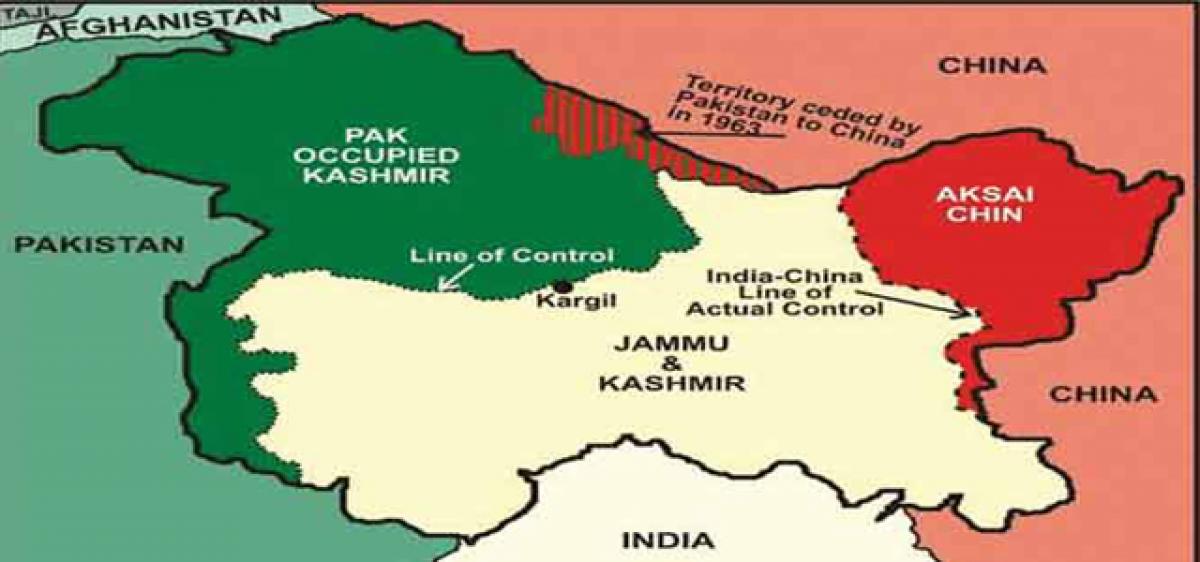Live
- Accused Sentenced to Life Imprisonment with Rigorous Punishment and Fined Rs. 25,000 for Murder
- ANR Centenary Celebrations Spread Across 31 Cities, Chiranjeevi to Receive ANR Award from Amitabh Bachchan
- Rahul Gandhi opposes quota abroad & violates Constitution: BJP MP
- Encounter breaks out in J&K’s Reasi
- RG Kar case: CBI custody of Sandip Ghosh, Abhijit Mondal extended till Sep 25
- J&K: Home Voting begins in all six Kathua Assembly segments
- Gurugram: Biker killed after being hit by SUV
- Bengal doctor’s body bars ex-member from all organisation activities over RG Kar case
- Centre and Seers serious over Tirumala Sacrilege
- LG ELECTRONICS ORGANIZES GRAND TECH SEMINAR IN HYDERABAD
Just In
Disclaiming Pakistan occupied Kashmir is not a prudent measure


Former Jammu & Kashmir Chief Minister Farooq Abdullah recently raised a furore by stating: “I tell them in plain terms-- not only the people of India, but also to the world – that the part (of Jammu and Kashmir) which is with Pakistan (PoK), belongs to Pakistan and this side to India.
Former Jammu & Kashmir Chief Minister Farooq Abdullah recently raised a furore by stating: “I tell them in plain terms-- not only the people of India, but also to the world – that the part (of Jammu and Kashmir) which is with Pakistan (PoK), belongs to Pakistan and this side to India.
This won't change.” This statement on Jammu and Kashmir (J&K) in general, and Pakistan occupied Kashmir (PoK) in particular, was made even as Dineshwar Sharma, the newly appointed interlocutor on J&K mandated to engage with a broad spectrum of stakeholders, made his maiden visit to the Valley. Within days, Farooq Abdullah supplemented his statement by noting: “How long shall we keep saying that (PoK) is our part? They too have atom bomb”.
Abdullah’s views elicited sharp criticism from certain quarters and endorsement from others. National Conference leader and former chief minister Omar Abdullah questioned the intent of past Congress-led governments on “taking back” PoK and challenged the present government to do so and prove his father wrong…This is not the first time that such an unrestrained reference undermining India’s position on PoK has been made by senior political leaders…
Its low-key standing claim on PoK notwithstanding, the territory does embody India’s broader position on J&K; namely, the entire territory of the erstwhile princely state is an integral part of India. This is because there is an umbilical link between India’s control over J&K and its standing claim on PoK. Via the Instrument of Accession, the entire territory of what then comprised the princely state of J&K, including what is since being referred to as PoK, acceded to India.
The accession was signed in India’s favour by the then ruler of the princely state, Maharaja Hari Singh, on October 26, 1947. It is this Instrument of Accession that warrants India’s territorial control over the entire J&K. India’s extant claim on PoK and its control on J&K are, therefore, inextricably linked. Besides, the Constitution of J&K contains a provision of 24 seats for the representatives of PoK “until the area of the State under the occupation of Pakistan ceases to be so…”
Public conversation on PoK within India is uninformed and pessimistic. It is a stark reality that there is inadequate academic focus on PoK in India. This is probably because PoK is considered academically irrelevant and less rewarding in comparison to a purely Valley-centric discourse. In contrast to the situation obtaining at present, PoK was vital to India’s defence of its position on Kashmir in the initial years after independence.
Though never pronounced officially, it is believed that successive governments have veered towards the position of retaining the status quo as the permanent solution to the festering issue of Kashmir by simply converting the present LoC into a permanent border.
India cannot afford to seem disowning its extant claim on PoK unless a steadfast guarantee, this time on paper, is extracted on retaining the territorial status quo. Until such a formulation appears on the horizon, it makes no difference to Pakistan whether India abandons its claim on PoK or not. On the contrary, even peripheral overtures indicating India’s disinterestedness in PoK will potentially weaken its position on the broader issue of Kashmir.
It is wishful thinking to assume that Pakistan would welcome the territorial status quo as propounded by some sections in India. The Kashmir issue substantially governs the undercurrents of Pakistan’s domestic polity. It is important to understand that Pakistan has long refused to accept the status quo by proclaiming support for secessionist groups in J&K. Its revisionist designs are even more obvious from the way Pakistan commissions militancy in the Valley and continues to house militant camps in PoK.
Of late, the China Pakistan Economic Corridor (CPEC) has given India’s claim on PoK a new lease of life. India has skilfully spun its reservations on the CPEC around the principle of territorial sovereignty and integrity. Therefore, apart from the bilateral imperatives vis-a-vis Pakistan as discussed above, presently, there are pressing geopolitical imperatives that must be heeded while formulating India’s policy position on PoK. In this regard, disregarding the territorial claim on PoK will only weaken India’s position on CPEC.
With CPEC placed under China’s Belt and Road Initiative (BRI), asserting claims to PoK has become a strategic necessity rather than an afterthought…There is an urgent need to build a broad consensus on PoK in order to fix the credibility deficit caused by sustained neglect across generations. Unless India sheds its nonchalant approach towards its claim on PoK, it cannot expect the rest of the world to take its position on J&K seriously. For the time being, India has few options other than continue to be relentless in pursuing its claim on PoK. (Courtesy: https://idsa.in)
By Priyanka Singh

© 2024 Hyderabad Media House Limited/The Hans India. All rights reserved. Powered by hocalwire.com






